Menu
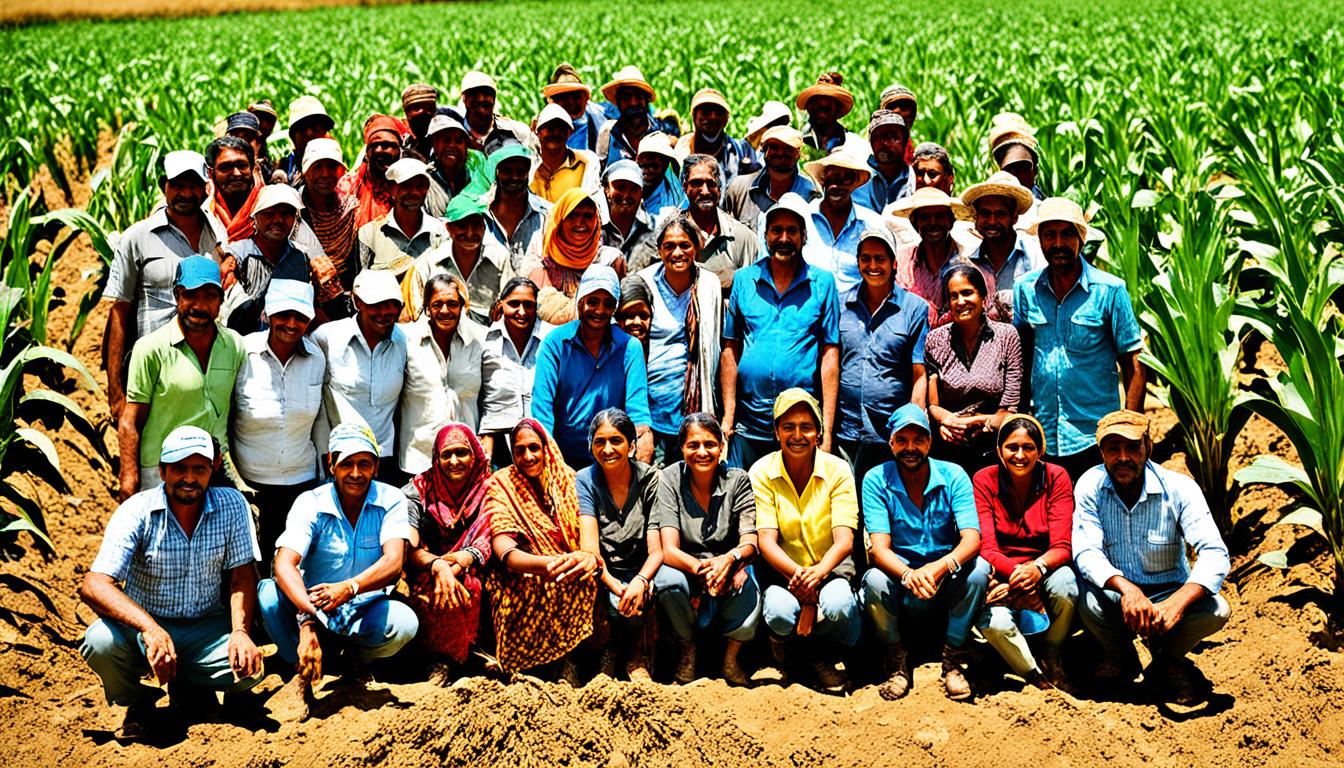
NGOs in Northern Ghana help farmers work together more effectively. They make these farmers 4.4% more efficient than others. This shows how important Non-Governmental Organisations are in helping farmers. They bring people together for better farming methods and results.
NGOs are great at getting local projects going, like certified organic farming. They do all this even though they don’t get as much help from the government as they should.
Agricultural NGOs play a crucial role in rural and farmer-focused projects. They link farmers, governments and the public. These groups push for better policies and help with sustainable farming. They tackle critical issues and offer farmers essential help.
In places like Zimbabwe, most people depend on farming. There, organisations like Fambidzanai Permaculture Center and PELUM Zimbabwe spearhead organic farming projects. These help small farmers a lot, even without much support from the government.
Recent statistics from Zimbabwe show a big spending on fertilisers and seeds. This underlines the need for NGOs to support farmers. They encourage affordable and sustainable farming to reduce the farmers’ costs.
Only growing one type of crop, like maize, can harm the land and reduce food production. NGOs support different crops and sustainable farming methods. They also help farmers sell their products, get better water access, and find funding for their work.
NGOs in organic farming get support directly from donors. This helps them do tasks usually managed by governments. It shows that now many see NGOs as key in bringing new farming methods and sustainability.
These NGOs and government collaborations make a bigger positive change in farming. They use their combined resources and knowledge for the good of all farmers.
Overall, NGOs are essential for sustainable farming’s growth. They provide education, find funds, and support local farming projects. Their work to change policies and promote sustainable farming is critical for the future of farming.
Farmer groups and rural charities are key in sparking cooperation among farmers. These joint efforts boost the use of resources, open up new markets, and raise productivity. They do this while keeping sustainability in mind. So, teaming up helps beat tough farming problems.
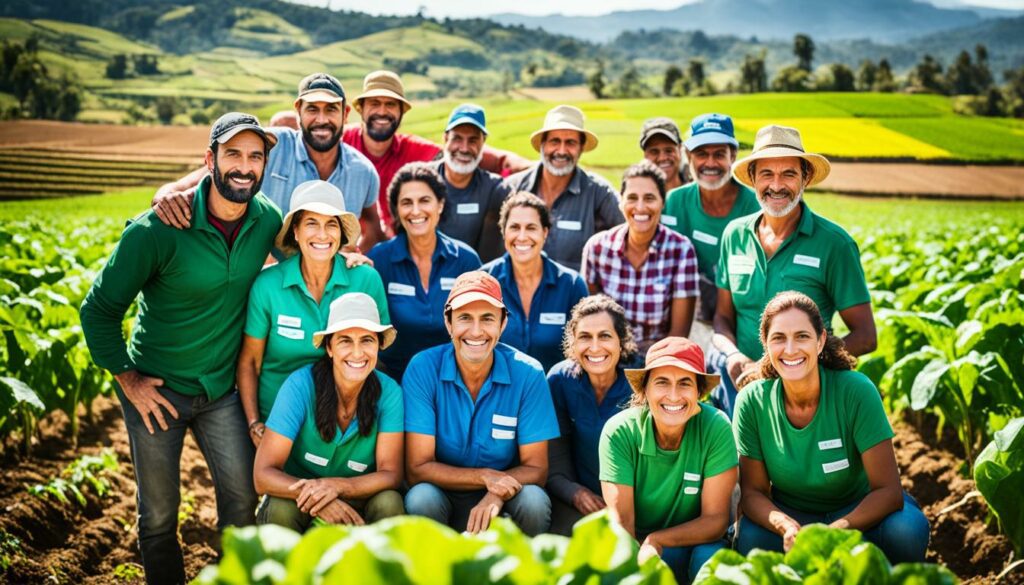
The teaming up approach by farmer groups can really make the most of what’s at hand. A study on 30 cases in the EU pointed out that joining forces improves the use of resources. Project-sharing helps make the most of inputs and perform better. For instance, farmers do better with crop choices and keeping the soil healthy by working together.
Charities in the countryside are great for helping farmers reach more buyers. In a project in England and Scotland, meetings helped everyone see problems in a new light. This led to farmers selling in better markets. As a result, their earnings went up, improving their lives.
Joining with other farmers can really boost how much you produce and care for the land. These groups help farmers keep learning and tailor new tech to their needs. They also focus on values they all share. This way, they can boost how much they produce in a way that’s kind to the environment.
Certified organic farming in Zimbabwe is a standout example of how working together helps everyone. It shows how farmer groups can better lives and take care of the planet. With 70% of people depending on farming, it’s key to address challenges they face. Small farmers, undertaking more than 70% of farming, meet obstacles like not enough resources and tough market competition.
Between 2012 and 2014, agriculture in Zimbabwe faced many problems. Around 79% of rural homes worried about not having enough food, scarce water, bad prices, and lacking resources. So, people had to spend a lot on things like fertilizers and seeds. Few had ways to irrigate their land – only 19% in 2012/2013 and 22% in 2013/2014. This meant big farmers often benefited more than small ones.
To tackle these issues, groups supporting sustainable farming became more active. NGOs like the Fambidzanai Permaculture Center and others started to help with organic farming. They focused on teaching farmers sustainable methods, improving soil, and getting fair trade certifications for better earnings.
Their work has led to significant positive changes. Income from organic farming and fair trade has boosted community development. Better soil health and water use have also helped the environment. The rising use of organic farming is showing it can fight food problems effectively.
Looking at Zimbabwe’s example shows how crucial farmer groups and sustainable farming organisations are. They are key to building strong agricultural methods. Despite the challenges, the actions of these NGOs are bringing real change to Zimbabwe’s farms.
Agricultural NGOs working with the government have made a big difference in Zimbabwe’s farms. They work together to solve many problems. These include helping rural areas grow and supporting farmers.
The Fambidzanai Permaculture Center works with the government and local people. They teach sustainable farming and help with water and organic farming. This makes farming better for everyone.
PELUM Zimbabwe has also helped by starting projects that look after rural families. They help where there aren’t enough resources and make markets more accessible. They are proud to see more families using irrigation, with numbers going up from 19% to 40%.
Still, there are big challenges. One is the lack of clear rules for organic farming. This can make farming harder for those who produce most of Zimbabwe’s food. Sometimes, getting supplies is not reliable.
Issues like culture and politics can also get in the way. They can make it hard to work together. Sometimes, there’s not enough money or support to make big changes. But, people are trying to fix these problems.

If everyone plans well and talks clearly, great things can happen. Strong farmer networks and clear goals are important. They show a bright future for Zimbabwean farming.
| Year | Percentage of Rural Households with Irrigation Capacity | Percentage of Rural Households Planting Maize | Challenges Faced by Rural Households |
|---|---|---|---|
| 2012/2013 | 19% | 22% | Food insecurity, water access, inadequate inputs, poor markets and prices (79%) |
| 2013/2014 | 40% | 25% | Food insecurity, water access, inadequate inputs, poor markets and prices (80%) |
Agricultural NGOs play a huge role in making farming methods sustainable. They help farmers use eco-friendly techniques and push for rules that are good for the planet. Their work is especially important in places like Zimbabwe, where most people depend on farming for a living. These NGOs help farmers work together and make agriculture better for the future.
NGOs work hard to get laws that protect the environment and help farming. For example, they are behind rules against cutting down trees and other steps that save the land. In Zimbabwe, good laws for farming are missing, so NGOs like the Fambidzanai Permaculture Center and the Zimbabwe Organic Producers and Processors Association push for organic farming. This type of farming is good for the earth and allows farmers to earn more by selling to special markets.
NGOs also teach farmers new skills and techniques. They focus on organic farming and growing trees with crops, which is known as agroforestry. In Zimbabwe, getting tools and loans has been tough for small farmers since 2000. NGOs help by offering training. This makes the soil healthier and the farms more productive. It also helps farmers sell to better markets outside Zimbabwe.
By working together, NGOs, farming groups, and organizations make agriculture greener and more profitable. They teach farmers and push for laws that help everyone. Thanks to their efforts, the future of farming looks more sustainable.
Agriculture support groups lead important funding projects for farmers. These efforts are key in helping farmers move to sustainable methods. The Patchwork Initiative by the Community Farm Alliance (CFA) is one such example, started in 2020.
The initiative works with farmers of colour in Kentucky. It partners with groups like Black Soil and Kentucky State University. These partnerships help farmers in many communities and zones across the state.
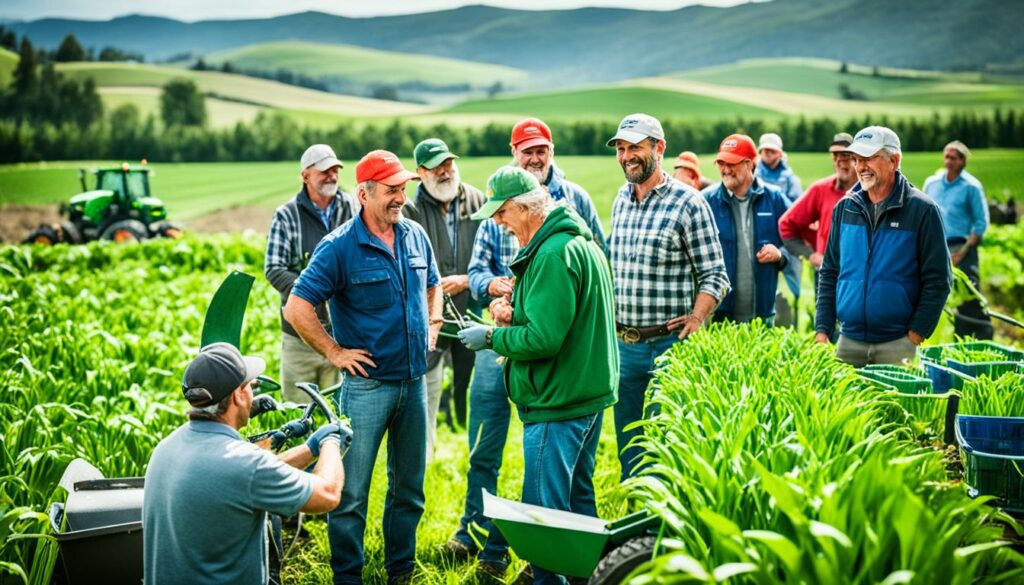
One big part is studying what black farmers need and face. This study helps plan programs, like the Kentucky Farmer of Color Capital Fund. It was renamed the Mattie Mack Farmer Fund in 2023.
NGOs that help farmers work together are making a big difference with their funding drives. The Kentucky Black Farmer Fund raised almost $76,000. It shows strong local support for helping farmers thrive. These funds don’t just help now; they help farmers find long-term success and markets.
| Funding Initiative | Details |
|---|---|
| Beginning Farmer and Rancher Development Program (BFRDP) | Fiscal Year 2024 anticipates $24,000,000 in funding. |
| Individual Award Range | $49,999 to $750,000, with no more than $250,000 per year for up to three years. |
| Curriculum and Training Clearinghouse Grant | Competed once every three years, with the next solicitation in FY 2025. |
| Technical Assistance Webinar | Scheduled for February 21, 2024, from 2:00 PM – 3:30 PM Eastern Time. |
The Annual Kentucky Black Farmer’s Conference and Blacker Berries project show the impact of farmer collaborations. They highlight how structured funding and support can boost agriculture majorly.
Non-governmental organisations (NGOs) have played a big role in pushing forward sustainable agriculture. They work closely with local people and international groups. This way, they show how crucial sustainable farming is. They bring new, smart solutions right to the field.
NGOs, together with groups focused on sustainable farming, introduce new ways to farm. Their ideas aim to make farms more productive without harming the planet. They encourage practices like growing different crops, permaculture, and organic farming. This helps farmers improve their soil and use nature’s gifts wisely.
In Zimbabwe, they push for organic farming despite challenges. This type of farming fights heavy rules and climate change. More than half of the people there depend on farming. These efforts involve teamwork and spreading the word about organic methods.
It’s key for NGOs in farming to keep a close eye on progress. They do thorough checks and collect data to see how their projects are doing. This info helps them make choices and suggest better ways to work. It makes sure that the farming methods help as many as possible and can change when needed.
An example is how small farmers in Zimbabwe do better with organic farming. This kind of farming makes their costs less and lets them sell products for more money. It also makes the soil healthier, less at risk from bad weather, and helps absorb carbon from the air.
NGOs join hands to learn and teach from real-life stories and scientific studies. Their combined knowledge is key to the broader goal of sustainable farming. They help farmers daily and support worldwide plans for a greener future. Their teamwork shows how important it is to work together in this field.
In the world of sustainable farming, NGOs are playing a vital role in working with farmers. They are making big steps forward in this area. The Fambidzanai Permaculture Center and Participatory Ecological Land-use Management (PELUM) Zimbabwe are great examples of this work.
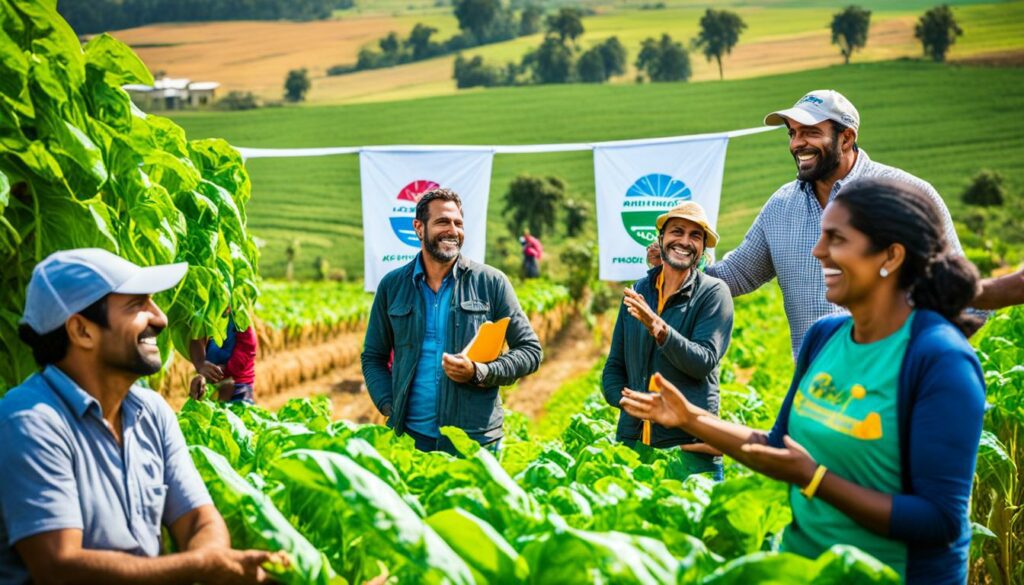
The Fambidzanai Permaculture Center is leading in teaching ecological farming. It trains farmers in permaculture, giving them much-needed knowledge and skills. It also helps set up groups of farmers working together.
By teaching and reaching out to the wider community, the centre supports farming that lasts. This includes using education and programmes to improve farming methods.
PELUM Zimbabwe is another group doing great things. They focus on improving farming in a way that’s good for the land. They work with local groups to teach about sustainable farming.
Their approach is to involve farmers in making choices about their land. This helps build strong farms and groups of farmers working together. It’s all about making farming that can overcome challenges.
Here’s a table showing how these groups are making a difference:
| NGO | Key Initiatives | Impact |
|---|---|---|
| Fambidzanai Permaculture Center | Permaculture Training, Outreach Programs | Creation of Farmer Cooperation Organizations, Enhanced Sustainable Practices |
| PELUM Zimbabwe | Ecological Land-use Management, Community-based Projects | Improved Farmer Involvement, Resilient Farming Systems |
These NGOs are essential for sustainable farming to keep improving. They back farmers in working together and finding community-based solutions. Both are key for long-lasting and productive farming.
Promoting farmer cooperations faces many challenges. These obstacles hold back the work of rural development charities and agricultural NGOs. They struggle due to weak government support and lack of resources.
A key challenge is the little help from governments. In Zimbabwe, important farming items like fertilisers and seeds made up a big part of costs. This was especially hard for small farmers. Also, few irrigation systems worked in 2012/2013 and 2013/2014. This shows the need for better support and policies.
Not having enough resources makes the work of NGOs even harder. Many Zimbabwean families planted maize, but almost a fifth didn’t have enough food. The following year, 80% faced food insecurity, with a quarter not getting enough to eat. These challenges link to the country needing to import food, too much control over food markets, and an unstable economy. These issues put at risk the lives of 70% of its agricultural population.
NGOs like the Fambidzanai Permaculture Center (FPC), PELUM Zimbabwe, and ZOPPA are key in helping. But, they face issues like not enough funds and resources. This hinders their work to improve farmer collaborations and supports.
| Season | Households Planting Maize (%) | Food Insecure Households (%) | Functional Irrigation Facilities (%) |
|---|---|---|---|
| 2012/2013 | 79% | 19% | 24% |
| 2013/2014 | 80% | 25% | 22% |
To make a real difference, more government help and resources are needed. The work of NGOs and charities is vital. But, with more support, they could do even more. Better support can lead to lasting growth in agriculture. This would bring better lives for many farming families.

It’s vital for NGOs to work well with farmers to improve agriculture and eco-friendly practices. A study found most farmer groups good at market skills but not all really ace them. So, targeted help is crucial.
The Catholic Relief Services’ guide, used in many places, suggests a four-step plan:
Dealing with people’s feelings and thoughts is key in these projects. Overcoming personal biases, fears, and social norms is crucial for them to accept new, green farming methods.
Also, good partnerships between NGOs and farmers need honest and clear talk. Making communication open and trust solid boosts success. It lets both sides know what to work on and how.
A study tour in 2005 visited farmers in Uganda, Bolivia, and India. It showed that to make a real change, you must understand local needs and adjust plans. The insights from this tour are very useful for doing better in sustainable farming.
One good way to spread the word is through farmer networks. Helping farmers teach each other can work wonders. It boosts their confidence in trying new farming methods.
To really improve farming in rural areas, the key is in smart strategies. Focusing on building good bonds with farmers can lead to better and greener farms. NGOs can make a real impact by focusing on these areas.
In the last thirty years, we’ve seen a push for farmer-led improvements in rural areas. Farmers, organisations, and interested parties often form networks to share ideas. These farmer cooperation organizations are key for managing resources and spreading new technologies.
NGOs are crucial in setting up these partnerships. They help connect small farmers with bigger markets. Through these connections, farmers share knowledge. This benefits both local and larger farming communities. Using non-commercial ways to spread innovations helps the whole area.
In places like rural China, the government steps in due to weak NGO influence. They aim to help farmers work together and share innovations. This highlights the need for support in spreading new ideas and the role of government in this process.
But, spreading new ideas faces challenges like lack of info or funds. Communication is key for success. Alongside, NGOs play a big role in helping farmers and outside groups work together. They aim to overcome issues and strengthen farmer cooperation organisations.
People view adopting new technologies in various ways. Some see it as trendy, others as a must. NGOs must understand these views to effectively support farmers. They aim to build and maintain farmer partnership networks.
| Innovation Barriers | Solutions |
|---|---|
| Lack of Information | Enhanced Communication Channels |
| Financial Constraints | Accessible Funding Opportunities |
| Traditional Systems | Education and Training Programs |
The AIS perspective recognises the importance of various players in innovating, including farmers. Models combining public, private, and non-profit sectors are key to innovation.
Farmers play a vital role in shaping these innovations, despite potential marginalisation. Collaboration helps in social learning, crucial for managing resources. NGOs must focus on farmer partnership networks.
NGOs are key in improving rural areas, fighting poverty, and narrowing social gaps. They enable sustainable use of resources and ensure everyone has the same chances out in the countryside.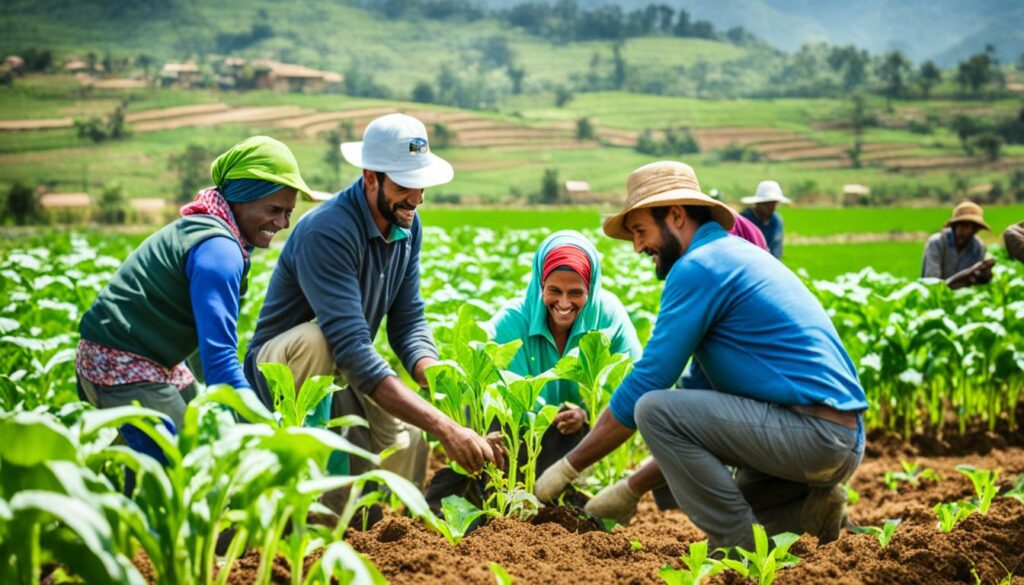
NGOs make big changes in rural communities. They build things like roads, run educational schemes, and boost healthcare. In Zambia, groups like Heifer Project International help locals improve their lives through learning and economic efforts. This lifts everyone up by managing resources well and getting everyone involved.
NGOs push for better farming that’s kind to the environment. In Zimbabwe, 80% of homes farmed maize in 2013/2014. NGOs helped by making farming smarter, making farmers make more food. They taught things like using fertiliser better and fixing water systems, to help those farms work better.
NGOs take on poverty and unequal treatment too. In Zimbabwe, many families didn’t have enough food in 2013/2014. NGOs brought farmers together and supported them, making it easier for farmers to sell their goods. This led to better trading and more food for everyone.
“The role of NGOs goes beyond just providing aid; they enable communities to uplift themselves by building sustainable frameworks that foster long-term socio-economic growth.” – Development Expert
Charities and NGOs unite farmers to create fair systems. In places like India, NGOs are listened to in big decisions. For example, during the seventh five-year plan (1985-1990), they had a major say in making villages self-sufficient.
In short, farmer groups and NGOs are vital for rural growth. Their work with local people and the government combats social issues. This helps both individual farmers and the countryside as a whole to develop in a lasting, equal way.
Zimbabwe faces many challenges and chances in its farming world. About 70% of its people depend on farming for their living. This makes the work of NGOs in encouraging sustainable farming very important. Most families in Zimbabwe’s rural parts farm, with 80% growing maize. But, they come across difficulties like not enough food, little water, not the right farming tools, and weak market setups. NGOs jump in to help farmers by giving them what they need to farm better.
Groups like Fambidzanai Permaculture Center (FPC), Participatory Ecological Land-use Management (PELUM) Zimbabwe, and the Zimbabwe Organic Producers and Processors Association (ZOPPA) lead the way. They help farmers make more money through certified organic farming. This method saves money on outside tools, opens up organic markets, and gets better prices. Fair trade certification, backed by NGOs, also adds to community development funds. This extra money improves the farming sector more.
Training and support are key for the many small farmers who run most of Zimbabwe’s farms. A survey from 2013/2014 found few homes had irrigation, and many of the systems that did exist didn’t work well. This shows the need for help from NGOs. They offer money and technology where the government can’t. They tackle big problems such as costly fertilisers and seeds. By using the help these groups give, Zimbabwe’s farmers can make their farms more productive and kinder to the earth.
NGOs act as the “middlemen” between farmers, the government, and society. They help farmers work together by teaching sustainable farming methods. This includes arranging education and training, finding money for new ideas, and promoting community farming projects.
Agricultural NGOs push for farming that’s good for the environment. They work to change policies and teach others about better farming methods. NGOs are big fans of using things like crop rotation and going organic. These methods make the soil better and help get more crops with less impact on the planet.
Farmers working together is key. It helps make the most of what they have, like sharing technology and know-how. This leads to better ways of farming and more income for farmers. It also makes farming kinder to the planet.
In Zimbabwe, NGOs are big supporters of organic farming, although it’s not easy. They face tough rules and changing weather. But, by teaching farmers about organic ways and helping them get fair trade certifications, things are improving. Soil is better, incomes are up, and nature is bouncing back.
NGOs and governments team up in farming by working on big projects and sharing ideas. For example, they push for farming methods that last and help rural areas grow. But, they do hit snags, like not having enough resources and facing politics.
NNNGOs push for better laws, teach through programs, and train farmers directly. They work to make sure policies are good and keep the forests safe. They also teach about organic and tree farming.
NGOs give out money through grants and loans. They also connect farmers to other sources of cash. This support helps farmers start or keep up sustainable practices.
NGOs make farming better by finding new and better ways to do things. They check how everything is going and help make choices about what to do next. This way, farming keeps getting better for the planet.
In Zimbabwe, NGOs like the Fambidzanai Permaculture Centre and PELUM Zimbabwe get people together. They help spread the word about gentle farming ways to other NGOs and community groups. This helps farming stay good for the land.
NGOs deal with a lack of help from the government and not enough money. These things can stop them from reaching more farmers and making farming better and fairer.
For NGOs to work well with farmers, they need to build trust. They have to be open and listen to what’s needed locally. This might mean organising groups, designing tech together, and letting farmers share what they know.
Farmer networks help manage resources better and share tech. NGOs set these places up for farmers to talk, plan, and help each other. It makes rural areas stronger and farming more reliable.
NNNGOs help rural areas grow by starting projects that help everyone. They fight poverty and make sure that farms and chances to earn are shared fairly. This makes life better in the countryside.
Farmers can use the help offered by NGOs to get better at farming in a way that’s good for the Earth. This includes money, advice on how to farm better, support for building things, and a way to find new ideas. This support helps farms do well and take care of the planet.